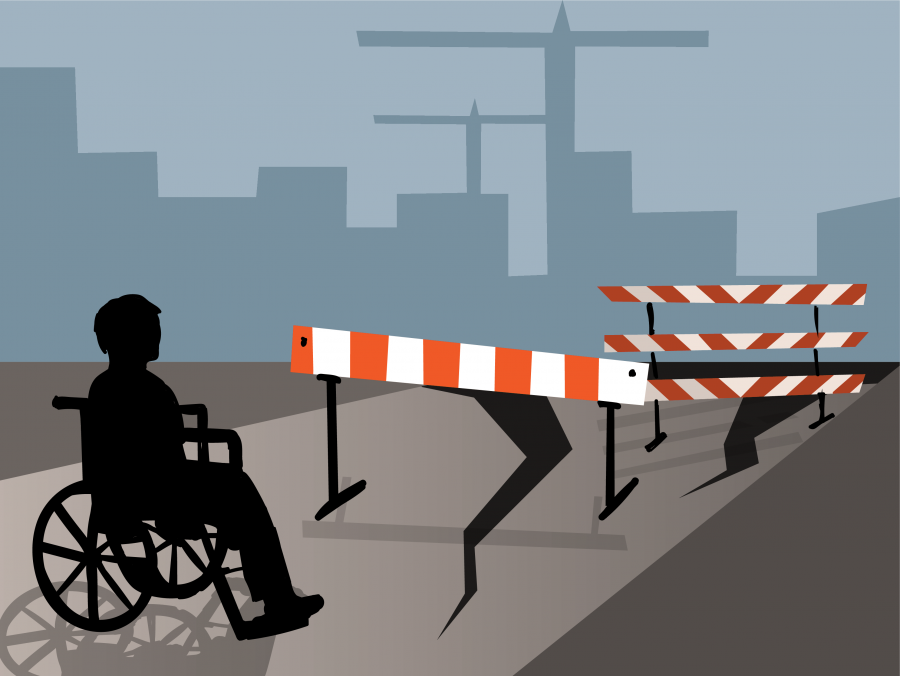Less than 35% of disabled students are projected to graduate with a four-year degree, and this number grows substantially smaller when you include completing the program in four years or less. In a country with 61 million disabled individuals, these numbers are bleak.
In the 136 years since the University’s doors have opened, very little has been done to make disabled students feel welcome. I’ve met multiple college students who would have loved to go here, but the cost and inaccessibility make a UT degree unattainable.
At UT, the process to receive disability accommodations takes months, and information regarding which disabilities are covered by accommodations is not made clear enough to all students. I was unable to receive help my freshman year. When I discussed my mental health with an employee at the Office of the Dean of Students, he told me that my problems would be “too severe” for the Counseling and Mental Health Center. I felt betrayed. The school that told me how much they do to help students with mental illnesses was telling me the office created specifically to help people like me was overworked and underfunded.
I wasn’t made aware that the University actually had programs in place to help me until over halfway through my second semester. Meanwhile, the stress of school and the feeling of betrayal by my university made me suicidal. I missed over a month of class and ended up in a mental hospital. I believed I was going to be forced to withdraw or would flunk out when I was sent to the Student Emergency Services office. I met with an incredibly kind woman who made me feel comfortable and told me I was eligible for accommodations. I recall feeling my face grow hot with fury and embarrassment at having avoided the offices out of anger and shame. It took three months from sending in my accommodations request to having my accommodations entered into the system, and I had to pay for an additional doctor’s appointment to obtain proof I needed.
However, last year, after feeling a clear difference in treatment from some of my professors, I made the decision to not use my accommodations. Many academics advise against disclosing disability because it can produce an environment with few chances for promotion or recognition. I ended up desperately needing my accommodations and eventually had to medically withdraw.
Now, a year and a half later, I still struggle with a lot of the same frustrations on this campus. I am regularly reminded that my existence and mental and physical well-being are not important to those in power.
I have to walk across campus during the hottest parts of the day with a thyroid condition that makes it difficult for me to control my internal temperature. I witnessed demonstrations on campus that exacerbated my PTSD and shamed me for being a survivor. I lost points off my grades due to my inability to make it to class on days my chronic stomach problems caused me too much pain.
Several schools have programs where students with mobility issues are granted free or low-cost transportation to and from classes. Not only do we not have this policy, we force our disabled students to pay extra for parking passes. Disabled students are also forced to move their cars to further lots if they happen to be located in a parking garage near the stadium for game days. It seems like the University is choosing to cater to its wealthy donors over disabled students on a daily basis.
Parking rules like this make it even harder to get to class, something that’s already a struggle for some students. Disabled students often need a vehicle to access campus because the few areas that have accessible housing are often incredibly difficult to find and not available near campus. West Campus has too many roadblocks, and Riverside is too far and often not up to ADA standards.
Students with disabilities are not helped by department policies that remove points from your grade after a certain number of missed classes. I understand the premise in requiring a doctor’s note for absences and assignments, but in a climate where doctor’s visits are a luxury many can’t afford, it’s harmful.
I could write a million words on all of the ways UT’s disabled population is silenced and diminished. It’s shameful and disgusting. How can we change the world while we aren’t allowing all of our students to meet their full potential?
Hester is a speech and language pathology junior.





















